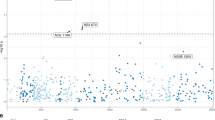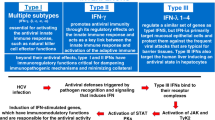Abstract
Chronic infection with the hepatitis C virus (HCV) affects 170 million people worldwide and is an important cause of liver-related morbidity and mortality1. The standard of care therapy combines pegylated interferon (pegIFN) alpha and ribavirin (RBV), and is associated with a range of treatment-limiting adverse effects2. One of the most important of these is RBV-induced haemolytic anaemia, which affects most patients and is severe enough to require dose modification in up to 15% of patients. Here we show that genetic variants leading to inosine triphosphatase deficiency, a condition not thought to be clinically important, protect against haemolytic anaemia in hepatitis-C-infected patients receiving RBV.
This is a preview of subscription content, access via your institution
Access options
Subscribe to this journal
Receive 51 print issues and online access
$199.00 per year
only $3.90 per issue
Buy this article
- Purchase on Springer Link
- Instant access to full article PDF
Prices may be subject to local taxes which are calculated during checkout



Similar content being viewed by others
References
Lavanchy, D. The global burden of hepatitis. Liver Int. 29, 74–81 (2009)
McHutchison, J. G. et al. Peginterferon α-2b or α-2a with ribavirin for treatment of hepatitis C infection. N. Engl. J. Med. 361, 580–593 (2009)
Ge, D. et al. Genetic variation in IL28B predicts hepatitis C treatment-induced viral clearance. Nature 461, 399–401 (2009)
van Wijk, R. et al. HK Utrecht: missense mutation in the active site of human hexokinase associated with hexokinase deficiency and severe nonspherocytic hemolytic anemia. Blood 101, 345–347 (2003)
de Vooght, K. M. K., van Solinge, W. W., van Wesel, A. C., Kersting, S. & van Wijk, R. First mutation in the red blood cell-specific promoter of hexokinase combined with a novel missense mutation causes hexokinase deficiency and mild chronic hemolysis. Haematologica 94, 1203–1210 (2009)
Bonnefond, A. et al. A genetic variant in HK1 is associated with pro-anemic state and HbA1c but not other glycemic control related traits. Diabetes 58, 2687–2697 (2009)
Peters, L. L. et al. Downeast anemia (dea), a new mouse model of severe nonspherocytic hemolytic anemia caused by hexokinase (HKI) deficiency. Blood Cells Mol. Dis. 27, 850–860 (2001)
Ganesh, S. K. et al. Multiple loci influence erythrocyte phenotypes in the CHARGE Consortium. Nature Genet. 41, 1191–1198 (2009)
Dickson, S. P., Wang, K., Kranz, I., Hakonarson, H. & Goldstein, D. B. Rare variants create synthetic genome-wide associations. PLoS Biol. 8, e1000294 (2010)
Bierau, J., Lindhout, M. & Bakker, J. A. Pharmacogenetic significance of inosine triphosphatase. Pharmacogenomics 8, 1221–1228 (2007)
Stocco, G. et al. Genetic polymorphism of inosine triphosphate pyrophosphatase is a determinant of mercaptopurine metabolism and toxicity during treatment for acute lymphoblastic leukemia. Clin. Pharmacol. Ther. 85, 164–172 (2009)
Sumi, S. et al. Genetic basis of inosine triphosphate pyrophosphohydrolase deficiency. Hum. Genet. 111, 360–367 (2002)
Cao, H. & Hegele, R. A. DNA polymorphisms in ITPA including basis of inosine triphosphatase deficiency. J. Hum. Genet. 47, 620–622 (2002)
Arenas, M., Duley, J., Sumi, S., Sanderson, J. & Marinaki, A. The ITPA c.94C>A and g.IVS2+21A>C sequence variants contribute to missplicing of the ITPA gene. Biochim. Biophys. Acta 1772, 96–102 (2007)
Stepchenkova, E. I. et al. Functional study of the P32T ITPA variant associated with drug sensitivity in humans. J. Mol. Biol. 392, 602–613 (2009)
Shipkova, M., Lorenz, K., Oellerich, M., Wieland, E. & von Ahsen, N. Measurement of erythrocyte inosine triphosphate pyrophosphohydrolase (ITPA) activity by HPLC and correlation of ITPA genotype-phenotype in a Caucasian population. Clin. Chem. 52, 240–247 (2006)
Atanasova, S. et al. Analysis of ITPA phenotype-genotype correlation in the Bulgarian population revealed a novel gene variant in exon 6. Ther. Drug Monit. 29, 6–10 (2007)
Maeda, T. et al. Genetic basis of inosine triphosphate pyrophosphohydrolase deficiency in the Japanese population. Mol. Genet. Metab. 85, 271–279 (2005)
The International HapMap Consortium. A haplotype map of the human genome. Nature 437, 1299–1320 (2005)
Russmann, S., Grattagliano, I., Portincasa, P., Palmieri, V. O. & Palasciano, G. Ribavirin-induced anemia: mechanisms, risk factors and related targets for future research. Curr. Med. Chem. 13, 3351–3357 (2006)
Fraser, J. H., Meyers, H., Henderson, J. F., Brox, L. W. & McCoy, E. E. Individual variation in inosine triphosphate accumulation in human erythrocytes. Clin. Biochem. 8, 353–364 (1975)
Motulsky, A. G. Drug reactions enzymes, and biochemical genetics. J. Am. Med. Assoc. 165, 835–837 (1957)
Goldstein, D. B. Common genetic variation and human traits. N. Engl. J. Med. 360, 1696–1698 (2009)
Purcell, S. et al. PLINK: a tool set for whole-genome association and population-based linkage analyses. Am. J. Hum. Genet. 81, 559–575 (2007)
Price, A. L. et al. Principal components analysis corrects for stratification in genome-wide association studies. Nature Genet. 38, 904–909 (2006)
Whitlock, M. C. Combining probability from independent tests: the weighted Z-method is superior to Fisher’s approach. J. Evol. Biol. 18, 1368–1373 (2005)
Ge, D. et al. WGAViewer: software for genomic annotation of whole genome association studies. Genome Res. 18, 640–643 (2008)
Acknowledgements
We are indebted to the IDEAL principal investigators, the study coordinators, nurses and patients involved in the study. We also thank E. Gustafson, P. Savino, D. Devlin, S. Noviello, M. Geffner, E. L. Heinzen, A. C. Need and E. T. Cirulli for their contributions to the study. This study was funded by the Schering-Plough Research Institute, Kenilworth, New Jersey. A.J.T. receives funding support from the National Health and Medical Research Council of Australia and the Gastroenterological Society of Australia.
Author Contributions J.F., A.J.T. and D.G. contributed equally. D.B.G., J.G.M., J.A., A.J.T. and J.F. defined the clinical phenotypes. J.F., A.J.T., D.G. and T.J.U. performed the statistical and bioinformatical analyses. K.V.S. performed the genotyping. C.E.G. and L.D.L. performed the sequencing experiments. P.Q., A.H.B., M.W., A.W., A.J.M., M.S., C.B. and J.A. collected and analysed the clinical data. A.J.M., M.S., J.G.M. and D.B.G designed the study. J.F., A.J.T. and D.B.G. wrote the manuscript with critical input from all authors.
Author information
Authors and Affiliations
Corresponding authors
Ethics declarations
Competing interests
J.G.M. and D.B.G. received research and grant support from Schering-Plough. J.G.M., A.J.M., M.S. and D.B.G. received consulting fees or acted in an advisory capacity for Schering-Plough. P.Q., A.H.B., M.W., A.W., C.B. and J.A. are employees of Schering-Plough, and Schering-Plough filed a patent application based on these findings. J.F., A.J.T., D.G., K.V.S., C.E.G., T.J.U., C.B., J.A., J.G.M. and D.B.G. are inventors of a patent application based on these findings.
Supplementary information
Supplementary Information
This file contains Supplementary Notes I-IV, Supplementary Tables 1-6 and Supplementary References. (PDF 446 kb)
Rights and permissions
About this article
Cite this article
Fellay, J., Thompson, A., Ge, D. et al. ITPA gene variants protect against anaemia in patients treated for chronic hepatitis C. Nature 464, 405–408 (2010). https://doi.org/10.1038/nature08825
Received:
Accepted:
Published:
Issue Date:
DOI: https://doi.org/10.1038/nature08825
This article is cited by
-
The deleterious effects of sofosbuvir and ribavirin (antiviral drugs against hepatitis C virus) on different body systems in male albino rats regarding reproductive, hematological, biochemical, hepatic, and renal profiles and histopathological changes
Scientific Reports (2024)
-
An ITPA Enzyme with Improved Substrate Selectivity
The Protein Journal (2024)
-
Inosine triphosphate pyrophosphatase from Trypanosoma brucei cleanses cytosolic pools from deaminated nucleotides
Scientific Reports (2022)
-
Defining the genetic and evolutionary architecture of alternative splicing in response to infection
Nature Communications (2019)
-
Efficacy and safety of ledipasvir/sofosbuvir with ribavirin in chronic hepatitis C patients who failed daclatasvir/asunaprevir therapy: pilot study
Journal of Gastroenterology (2018)
Comments
By submitting a comment you agree to abide by our Terms and Community Guidelines. If you find something abusive or that does not comply with our terms or guidelines please flag it as inappropriate.



